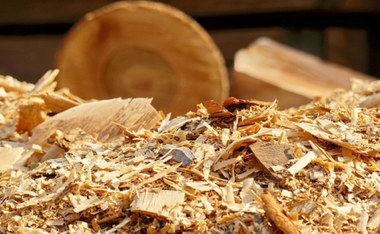Launch of bio-based Cyrene to replace toxic solvents
(12-08-2019) Two partners of the GREEN-CHEM network, the GCCE at University of York and Circa Sustainable Chemicals UK, developed a new bio-based solvent named ‘Cyrene’.
Researchers from Green Chemistry Centre of Excellence(GCCE) and Circa Sustainable Chemicals UK, two partners of GREEN-CHEM, developed a new and safer bio-based solvent named ‘Cyrene’ which is produced in two steps from renewable cellulose obtained from plantation softwood sawdust, resulting in a significantly lower environmental footprint than traditionally used solvents.
The GCCE researchers working with Circa staff showed in several experiments that Cyrene can successfully be employed as a solvent in common synthetic chemistry reactions and in graphene processing in place of two frequently used but toxic solvents, dimethylformamide (DMF) and N-methylpyrrolidone (NMP). “Cyrene is a response to soaring demand for safer, greener alternatives to DMF and NMP” says Jeff Eaves, General Manager of Circa Sustainable Chemicals Ltd.
Non-toxic and eco-friendly
The novel bio-based solvent ‘Cyrene’ can meet the demand for safer alternatives for certain hazardous solvents. Jeff Eaves: “Cyrene has an acute toxicity ten times lower than the caffeine that most of us ingests with our coffee or tea at breakfast.” Cyrene is not mutagenic, unlike DMF, it does not sensitize the skin, it is completely biodegradable and is not toxic to any of the microorganisms in receiving waters or aerobic waste water treatment plants.
Broadly used
Solvents are involved in the production of many everyday products. Worldwide, more than 20 million tons of solvents are used every year for the manufacturing and processing of pharmaceuticals, food, plastics and many chemical products. Solvents are the major ingredient in paints, cosmetics, coatings and home cleaning products. However, the majority of these solvents are a possible risk for human health and/or the environment. “As the use of certain hazardous solvents becomes untenable, there is an urgent need to replace them with safer substitutes” says Jeff Eaves.
Sustainable Solvent Selection Service
Under European regulations (REACH) and other global legislation, the use of certain solvents in formulations, cleaning applications, and chemical manufacturing is being restricted.
Therefore, the Sustainable Solvent Selection Service, or ‘S4’, was developed by the GCCE. S4 offers advice and scientific expertise regarding solvents, solvent use and replacing hazardous solvents, and promotes bio-based and sustainable products. “We want to develop new bespoke solvents according to the specific application required” explains Professor James Clark, Director of the GCCE
Switch to renewable resources
We are facing several global challenges, such as depleting fossil resources, increased demand for energy and chemical products and global warming. In this respect, more sustainable and green chemistry is crucial and can be partly achieved by using more sustainable, renewable and biodegradable materials. “Cyrene complies with these future requirements, as it is made from renewable cellulose and it is bio-degradable” states Jeff Eaves.
Commercialization
Circa will now focus on the commercial opportunities for Cyrene. That is why they are bringing on stream a 50 ton/year plant to produce Cyrene in Tasmania together with joint-venture partner Norske-Skog. Plans are underway for a fully commercial scale plant. REACH Annex VII has been achieved for Cyrene and work is progressing for Annex VIII which they expect to achieve in the first half of 2018.
“The launch of Cyrene is only a first step in the replacement of hazardous solvents with safer and more sustainable substitutes. We aim for a greener future with a substantial amount of bio-based solvents”, concludes Professor James Clark.
